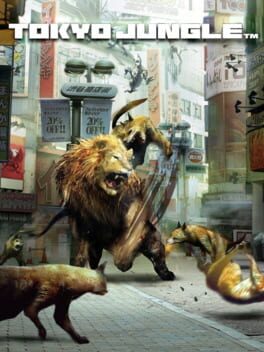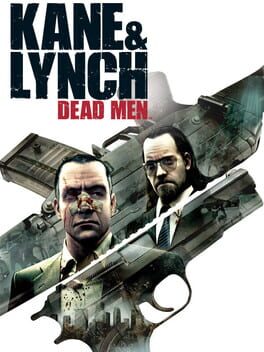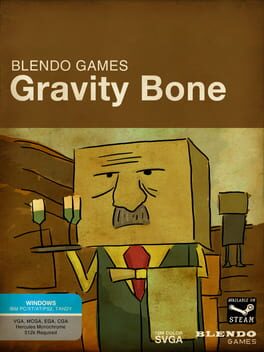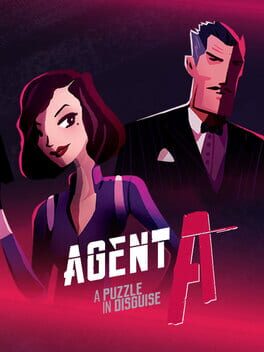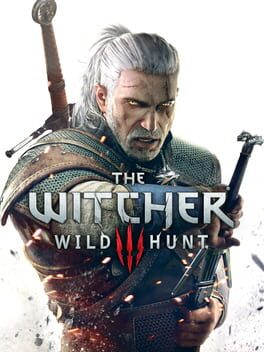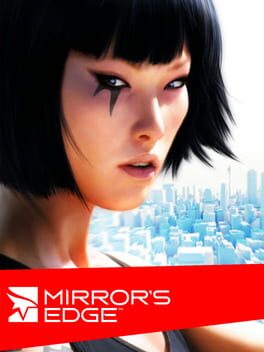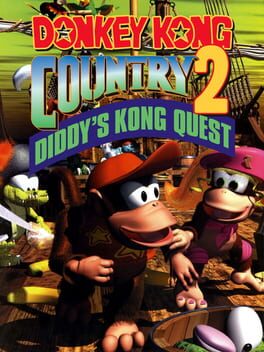sam_gray
2012
The reputation on this one was Japanese and Weird, which is certainly true of a story mode that goes to some crazy places. But it’s the survival mode that best captures Werner Herzog’s view of nature, encouraging "no kinship, no understanding, no mercy". The absurdity of seeing a Pomeranian demolish a gazelle in slow-motion soon gives way to the terror of an empty hunger bar with no food in sight, or being ambushed by a gang of predators, hidden by the cover of rain - with thrumming techno music and stat-boosting challenges further driving the brutal tension of a literal dog-eat-dog world. Its genius lies in the random events and weather changes that discourage any kind of complacency. You must feed, breed, and hide to survive, but most importantly keep moving, as you never know when your section of the city will turn against you. It's clearly the best game ever made about global warming. Buy it while you still can!
So conceptually brilliant it doesn't really require explanation - it distils everything that's good about 30-odd years of Zelda (and Dark Souls, and Shadow of the Colossus, and the Elder Scrolls, etc, etc) and does away with almost everything that's unnecessary. Maybe lacks the weirder edges of Majora's Mask or Twilight Princess, but that's why sequels exist. The barebones story is even rather moving, especially the hunt for memories - it reminded me of something like BS Johnson's The Unfortunates, scattered pieces of a puzzle whose incompleteness is the point. It ends in a place of hope, but acknowledges the sacrifices and failures that paved its way. Which is rare, even for a franchise as thoughtful as this.
Really dug this for a while. The shooting is awkward, but there’s a blunt verisimilitude to the gunfights, an attention to detail with e.g. your teammates giving you ammo when you’re low, or where being revived with adrenaline too frequently leads to an overdose. The game apes Michael Mann better than most, most blatantly with the nightclub shootout - the screaming crowds are a great touch - or the later Heat-inspired getaway on the streets of Tokyo. What it doesn’t attempt to capture is Mann’s romance. There’s no attempt to lend Kane & Lynch’s quest justification of any sort. They’re bad men - in Lynch’s case, bad in a clinically insane kind of way - and the game is at its best when exploring this blackly comedic dynamic, where one tries to rein the other one in but both, predictably, bring out the worst in each other. Unfortunately, the game falls off a cliff at the midway point, turning into an awful guerrilla warfare shooter that’s full of insanely difficult bullshit. But points to its grimy B-movie vibes until then.
2019
This isn't entirely the game's fault, which plays well and makes good use of vertical movement, but I'm not particularly into this strain of indie games that posit themselves as aggressively nice - perhaps as a response to years of aggressively nasty AAA titles - at the expense of anything negative that might break the spell. The lower-caps, self-aware dialogue felt cutesy instead of human. Give me more moments like the rain-soaked graveyard, or the perilous journey through the snow, and maybe the self-congratulatory ending might feel less hollow.
2015
I really tried with this, and I can see why some find it so charming - the sidequests have an amusing, inventive wit, and the typical life-of-crime, fall & rise set-up is intelligently shaded. But there's also way too much time spent watching cutscenes, and the snippets of gameplay we get aren't quite compelling enough to make it worthwhile. The tactics in the brawls just boiled down to mashing buttons and occasionally using an unlimited supply of healing items. There's no tension to it. And the side bits - karaoke, flirting with the bowling receptionist, Mr. Shakedown - are fine, but heavily compartmentalised, like everything else. I wasn't expecting GTA, but there's a lack of flow here that I found unproductively claustrophobic. Will revisit down the road, maybe.
A clunky game, like its predecessor, and yet even more confident, experimental, and detail-oriented that complaints about it being "uncomfortable" to play become totally insignificant. The structure is ambitious, to say the least, based around clones and copies; the sense of déjà vu is inherently game-like, the notion of the virtual disconnecting one from reality is incorporated into the game's fabric that is, itself, in an uncanny state of decay. I'm sure the brilliant boss fights, tight environmental design, and disorienting perspective shifts have all been analysed to death by this point, but what a thrill to experience even twenty years on, especially the moment when Kojima disregards the action climax to go full Adam Curtis with the motivation of the "villains". Only the Raiden/Rose dynamic falls short. Roll on Snake Eater.
2008
2015
2001
A game about architecture, first and foremost, with the camera either positioning itself at the best angle to reveal the space, or making it clear to the player that they have to explore the offscreen space. Not exactly a masterpiece - the puzzles are sometimes perfunctory, and the combat is actively annoying - but there is something stirring about the hand-holding mechanic, the controller vibrating with Yorda’s every movement. She’s a fragile, real presence, with the standard “escort quest” frustrations - get over here, do that - a conscious part of the experience. (There’s a psychosexual triangle to be drawn between the virginal Yorda, the jealous mother, and possessive teenage boy Ico, whose “horns” are eventually removed/castrated.) All of which to say I found the ending very powerful. The castle we’ve grown so familiar with crumbles, and the power dynamic between the pair reverses - we are made helpless by a beautifully-scored cutscene, the untranslated farewell a perfect note to end on. (The epilogue is a mistake.) Clearly inspired many a developer to make their game as pretentious as possible, though Hidetaka Miyazaki would take the ball and run with it with Boletarian Palace.
The most fun to be had is definitely in the early stages, after you've accepted the awkward combat, animations, character models, writing, etc. A powerful video game hero brought low by using their detective powers to help local townsfolk in oddball mysteries: fine. Fun, even. But the game gradually discourages this by assigning levels to quests, keeping you on the rails of the main plot. And Jesus Christ, what a slog. No wonder most don't even finish it.
It's not like the pursuit of the MacGuffin-y missing person is an uncommon plot device. But this is hardly The Searchers - it's a wild goose chase. I haven't played the previous two games, so it's possible there's an emotional element I'm missing - although as far as I'm aware, Ciri and Yennifer don't even appear in those, as Geralt suffers from amnesia. Perhaps the point is that our main character has finally pieced together his life, and needs that illusive final piece to feel whole again.
But where is that in the writing? There's so much of it here, so much stuff, and almost none of it amounts to anything. Sure, you can get a different cutscene here, a romance there, but the nature of the game is that it wants to flatter you at every turn, give you a chance to try everything. That is, unless you don't play catch enough with your boring daughter - a moral choice that doesn't announce itself as such, which could be bold if there was any attempt at complex human psychology. But no: getting the "bad" ending is a "gotcha!", a conservative scolding that punishes you for supposedly thinking of yourself as the hero, even though the game encourages that line of thinking with Geralt's increasingly cop-like domination over quests with very limited outcomes.
The characters move like mannequins - they repeat themselves, they phase through each other, they whine and curse but seldom feel particularly real. They're all part of the game's arrogance, which uses constant cutscenes and a sat-nav of a minimap to make sure the player does everything they're supposed to. And even if they do, the game might crash or bug out. I'm not surprised that Cyberpunk is bad - this seems to be the accepted state of the open world by this point, something that tells the player to stand in awe of its grand design while resolutely underwhelming on a moment-by-moment basis; until the sloppiness becomes accepted, even routine.
One final thought: what is going on with all the female character designs? It's so blatantly misogynistic that I'm almost surprised there wasn't more uproar. The female soldier who gets told off for continually wearing her blouse open - what is this, the 1960s? Rancid.
It's not like the pursuit of the MacGuffin-y missing person is an uncommon plot device. But this is hardly The Searchers - it's a wild goose chase. I haven't played the previous two games, so it's possible there's an emotional element I'm missing - although as far as I'm aware, Ciri and Yennifer don't even appear in those, as Geralt suffers from amnesia. Perhaps the point is that our main character has finally pieced together his life, and needs that illusive final piece to feel whole again.
But where is that in the writing? There's so much of it here, so much stuff, and almost none of it amounts to anything. Sure, you can get a different cutscene here, a romance there, but the nature of the game is that it wants to flatter you at every turn, give you a chance to try everything. That is, unless you don't play catch enough with your boring daughter - a moral choice that doesn't announce itself as such, which could be bold if there was any attempt at complex human psychology. But no: getting the "bad" ending is a "gotcha!", a conservative scolding that punishes you for supposedly thinking of yourself as the hero, even though the game encourages that line of thinking with Geralt's increasingly cop-like domination over quests with very limited outcomes.
The characters move like mannequins - they repeat themselves, they phase through each other, they whine and curse but seldom feel particularly real. They're all part of the game's arrogance, which uses constant cutscenes and a sat-nav of a minimap to make sure the player does everything they're supposed to. And even if they do, the game might crash or bug out. I'm not surprised that Cyberpunk is bad - this seems to be the accepted state of the open world by this point, something that tells the player to stand in awe of its grand design while resolutely underwhelming on a moment-by-moment basis; until the sloppiness becomes accepted, even routine.
One final thought: what is going on with all the female character designs? It's so blatantly misogynistic that I'm almost surprised there wasn't more uproar. The female soldier who gets told off for continually wearing her blouse open - what is this, the 1960s? Rancid.
1998
Important, a classic etc. that nonetheless vacillates wildly between being brilliant and infuriating - it’s a bit of a chore to actually play. The top-down perspective makes the actual 3D space irrelevant for large stretches as the radar does the heavy lifting, though there’s still a tendency to get shot from off-screen, and actually aiming at anything is a nightmare. The characters are all quite badly written, vomiting up their backstories and overexplaining every single moment of subtext ad naseum to Snake’s increasingly hilarious bewilderment, leading to exchanges like: “I’m feeling sad.” “Sad?” “Yes, sad. It’s when the endorphins in your brain don’t fire enough, leading to a lack of energy and motivation.” “I didn’t know your brain controlled your feelings...”
But something that still felt fresh was the Codec, where every one of your contacts says something different every time you walk into a different room, or do something notable - e.g. equipping the cigarettes to get scolded, or repeatedly ringing one until they ignore you. There’s a conscious effort to erase the barrier between gameplay and “story”, which is usually treated as a separate, isolated quality in video game criticism instead of inherent to game-feel. I was impressed with the torture sequence - not only is failure here an option, but it’s the more interesting one, undermining the pastiche of Hollywood action heroics and paying off with a suitably down climactic beat. And while I wasn’t always impressed with the boss fights (especially the gimmicky Psycho Mantis) there’s an admirable sense of experimentation in making them all different. The pacing and build-up to each works well, and there’s some effort to complicate our relationship to them as “enemies”, e.g. Grey Wolf embracing pain. (My favourite was Vulcan Raven and his mini gun, which plays to all the strengths of the stealth gameplay.)
Admirably anti-war in its sentiments, also pretentious, sexist, and with laughable stabs at pathos - though this is, as far as I can tell, Hideo Kojima’s whole deal. Auteurism sometimes demands you take the rough with the smooth.
But something that still felt fresh was the Codec, where every one of your contacts says something different every time you walk into a different room, or do something notable - e.g. equipping the cigarettes to get scolded, or repeatedly ringing one until they ignore you. There’s a conscious effort to erase the barrier between gameplay and “story”, which is usually treated as a separate, isolated quality in video game criticism instead of inherent to game-feel. I was impressed with the torture sequence - not only is failure here an option, but it’s the more interesting one, undermining the pastiche of Hollywood action heroics and paying off with a suitably down climactic beat. And while I wasn’t always impressed with the boss fights (especially the gimmicky Psycho Mantis) there’s an admirable sense of experimentation in making them all different. The pacing and build-up to each works well, and there’s some effort to complicate our relationship to them as “enemies”, e.g. Grey Wolf embracing pain. (My favourite was Vulcan Raven and his mini gun, which plays to all the strengths of the stealth gameplay.)
Admirably anti-war in its sentiments, also pretentious, sexist, and with laughable stabs at pathos - though this is, as far as I can tell, Hideo Kojima’s whole deal. Auteurism sometimes demands you take the rough with the smooth.
2009
I'd give the edge to Dark Souls, which has one of my favourite game mechanics ever - the Estus Flasks - and that incredible, interconnected journey to Anor Londo, which takes the player down into a literal Hell and then back up to Mount Olympus to become a God. And I like the fact that Firelink Shrine is mere seconds away from danger, whereas it's a bit too easy to retreat into the Nexus here - even if the music changes and the murderous Yurt undercut its safety somewhat.
Still, what a game! Five distinct areas, overflowing with atmosphere, and with some of the best level design I've ever seen. Specialising in magic made some of the boss fights trivial, but getting to them is all kinds of incredible. Tower of Latria is an obvious standout, though all of them work together in harmony, and the player-created structure - which lets you move between levels, using the items you've found in one to help you out in the other - is so inspired. My favourite might actually be the swamp in the Valley of Defilement, which, by removing your depth perception and mobility, becomes infinitely terrifying. And even the ending is good, tempting you with the promise of more Souls for when you inevitably play through it again. I wish they hadn't bothered with a remake. It's basically perfect as it is.
Still, what a game! Five distinct areas, overflowing with atmosphere, and with some of the best level design I've ever seen. Specialising in magic made some of the boss fights trivial, but getting to them is all kinds of incredible. Tower of Latria is an obvious standout, though all of them work together in harmony, and the player-created structure - which lets you move between levels, using the items you've found in one to help you out in the other - is so inspired. My favourite might actually be the swamp in the Valley of Defilement, which, by removing your depth perception and mobility, becomes infinitely terrifying. And even the ending is good, tempting you with the promise of more Souls for when you inevitably play through it again. I wish they hadn't bothered with a remake. It's basically perfect as it is.
2008
I gave up on Donkey Kong Country somewhere around the ice levels, though I'd been tempted to all the way back at the first minecart hellscape. Catching the player by surprise with a precise jump or off-screen enemy they have no time to prepare for is old-school sadism, aimed at people who'd rather memorise a layout than question its design. I've got no patience for it.
This, on the other hand, is a gem. It makes the small but significant change in its design philosophy that the player should be prepared for the challenges they have to face. So each level tells you how to play it at the start, then slowly ramps up the difficulty so you have only yourself to blame for mistakes. On a macro level, the difficulty increases steadily as well - the game builds on its own architecture while constantly throwing in new surprises. And thank God for Trixie Kong. Her flutter is a game changer, especially with the emphasis on vertical levels. Though it should be said that the two partners feel balanced this time, instead of cumbersome Donkey Kong dragging down his own game.
I still have a few issues with the shaded graphics, which sometimes make confusing e.g. what is and isn't a ledge. But in every way - not just gameplay-wise but musically, stylistically - it's a terrific improvement.
This, on the other hand, is a gem. It makes the small but significant change in its design philosophy that the player should be prepared for the challenges they have to face. So each level tells you how to play it at the start, then slowly ramps up the difficulty so you have only yourself to blame for mistakes. On a macro level, the difficulty increases steadily as well - the game builds on its own architecture while constantly throwing in new surprises. And thank God for Trixie Kong. Her flutter is a game changer, especially with the emphasis on vertical levels. Though it should be said that the two partners feel balanced this time, instead of cumbersome Donkey Kong dragging down his own game.
I still have a few issues with the shaded graphics, which sometimes make confusing e.g. what is and isn't a ledge. But in every way - not just gameplay-wise but musically, stylistically - it's a terrific improvement.
